| Listing 1 - 10 of 31 | << page >> |
Sort by
|
Book
ISBN: 9780230368316 Year: 2013 Volume: *1 Publisher: Basingstoke Palgrave Macmillan
Abstract | Keywords | Export | Availability | Bookmark
 Loading...
Loading...Choose an application
- Reference Manager
- EndNote
- RefWorks (Direct export to RefWorks)
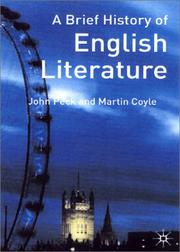
ISBN: 0333791762 9780333791769 9780333791776 0333791770 Year: 2002 Publisher: Basingstoke Palgrave
Abstract | Keywords | Export | Availability | Bookmark
 Loading...
Loading...Choose an application
- Reference Manager
- EndNote
- RefWorks (Direct export to RefWorks)
History --- English literature --- #KVHA:Literatuurgeschiedenis; Engels --- 820 <09> --- Engelse literatuur--Geschiedenis van ... --- History and criticism. --- 820 <09> Engelse literatuur--Geschiedenis van ... --- History and criticism --- Engelse literatuur--Geschiedenis van .. --- Great Britain --- Intellectual life. --- Engelse literatuur--Geschiedenis van . --- Engelse literatuur--Geschiedenis van
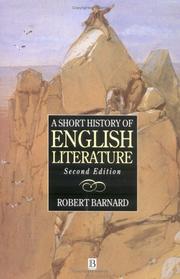
ISBN: 0631190880 9780631190882 Year: 1996 Publisher: Oxford Blackwell
Abstract | Keywords | Export | Availability | Bookmark
 Loading...
Loading...Choose an application
- Reference Manager
- EndNote
- RefWorks (Direct export to RefWorks)
History --- English literature --- -Engelse literatuur--Geschiedenis van ... --- -820 <09> Engelse literatuur--Geschiedenis van ... --- Engels: literatuurgeschiedenis --- 820 <09> --- 820 <09> Engelse literatuur--Geschiedenis van ... --- Engelse literatuur--Geschiedenis van ... --- History and criticism --- Great Britain --- Intellectual life. --- History and criticism. --- Engelse literatuur--Geschiedenis van .. --- Engelse literatuur--Geschiedenis van . --- Littérature anglaise --- Histoire --- English literature - History and criticism --- Great Britain - Intellectual life --- Engelse literatuur--Geschiedenis van
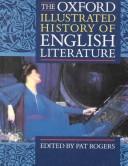
ISBN: 0192827286 0198128169 9780198128168 Year: 1990 Publisher: Oxford Oxford university press
Abstract | Keywords | Export | Availability | Bookmark
 Loading...
Loading...Choose an application
- Reference Manager
- EndNote
- RefWorks (Direct export to RefWorks)
820 <09> --- 820 <09> Engelse literatuur--Geschiedenis van ... --- Engelse literatuur--Geschiedenis van ... --- -Engelse literatuur--Geschiedenis van ... --- -820 <09> Engelse literatuur--Geschiedenis van ... --- English literature --- History and criticism --- Engelse literatuur--Geschiedenis van .. --- Great Britain --- Intellectual life. --- History --- History and criticism. --- Littérature anglaise --- Histoire et critique --- Engelse literatuur--Geschiedenis van . --- Engelse literatuur--Geschiedenis van --- English literature - History and criticism --- Litterature anglaise
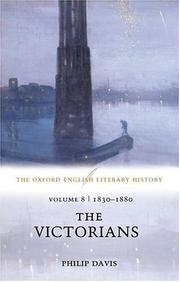
ISBN: 0199269203 0198184476 9780198184478 9780199269204 Year: 2002 Volume: 8 Publisher: Oxford Oxford university press
Abstract | Keywords | Export | Availability | Bookmark
 Loading...
Loading...Choose an application
- Reference Manager
- EndNote
- RefWorks (Direct export to RefWorks)
The Victorian era produced a literature of diversity and experimentation, engaged with powerful controversies and heartfelt arguments that lie at the centre of the formation of the modern world. It has often been misrepresented, either as an age of dull and rigid certainty or one of anxious and depressive morbidity, but what distinguishes the writing of the period - from its origins in the 1830s to its crisis point around 1880 - is its power of serious inquiry. It poses questions about the relation between society and the individual, the rival claims of market and morality, the form and function of democracy, and, above all, the existence or non-existence of God and the purposes of human life. Such concerns make this a time in which literature has a new urgency and vitality, and lies close to the heart of a culminating crisis of the Western conscience.
820 <09> --- 820 <09> Engelse literatuur--Geschiedenis van ... --- Engelse literatuur--Geschiedenis van ... --- English literature --- anno 1800-1899 --- Engelse literatuur--Geschiedenis van .. --- Engelse literatuur--Geschiedenis van --- LITTERATURE ANGLAISE --- GRANDE-BRETAGNE --- 19E SIECLE --- HISTOIRE ET CRITIQUE --- HISTOIRE --- 1837-1901 (VICTORIA)
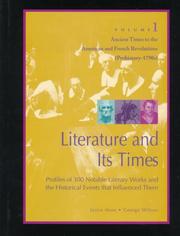
ISBN: 0787606065 1414435711 Year: 1997 Publisher: Detroit Gale
Abstract | Keywords | Export | Availability | Bookmark
 Loading...
Loading...Choose an application
- Reference Manager
- EndNote
- RefWorks (Direct export to RefWorks)
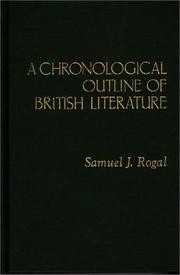
ISBN: 0313214778 9780313214776 Year: 1980 Publisher: Westport, Conn. Greenwood
Abstract | Keywords | Export | Availability | Bookmark
 Loading...
Loading...Choose an application
- Reference Manager
- EndNote
- RefWorks (Direct export to RefWorks)
English literature --- Outlines, syllabi, etc --- 820 <09> --- -British literature --- Inklings (Group of writers) --- Nonsense Club (Group of writers) --- Order of the Fancy (Group of writers) --- Engelse literatuur--Geschiedenis van ... --- -Engelse literatuur--Geschiedenis van ... --- 820 <09> Engelse literatuur--Geschiedenis van ... --- -820 <09> Engelse literatuur--Geschiedenis van ... --- English drama --- English fiction --- English poetry --- Engelse literatuur--Geschiedenis van .. --- Engelse literatuur--Geschiedenis van --- English literature - Outlines, syllabi, etc
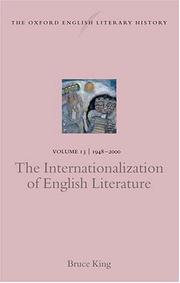
ISBN: 0198184239 9780198184232 0199288356 9780199288359 Year: 2004 Volume: 12 Publisher: Oxford Oxford University Press
Abstract | Keywords | Export | Availability | Bookmark
 Loading...
Loading...Choose an application
- Reference Manager
- EndNote
- RefWorks (Direct export to RefWorks)
English Literature in the 1960s soon threw off its post-war weariness and the tepid influences of the previous decade. New voices, new visions, and new commitments profoundly reshaped writing during the sixties, and throughout the rest of the century. Drama thrived on its rapidly rebuilt foundations. New freedoms of style and form revitalized fiction. Poetry, too, gradually recovered the variety and inventiveness of earlier years. As well as comprehensively charting these changes in the literary field, Randall Stevenson persuasively pinpoints their origins in the historical, social, and intellectual pressures of the times. Literary developments are revealingly related to the wider evolution and profound changes in English experience in the late twentieth century -- to shadows of war and loss of empire; declining influences of class; shifting relations between the genders; emergent minority and counter-cultures; and the broadening democratization of contemporary life in general. Analyses of the rise of literary theory, of publishing and the book trade, and of the pervasive influences of modernism and postmodernism contribute further to an impressively thorough, insightful description of writing in the later twentieth century -- a literary period Stevenson shows to be far more imaginative and exciting than has yet been recognized. Lucid, accessible, and engaging, this volume of the Oxford English Literary History presents a unique illumination of its age -- one we have lived through, but are only just beginning to understand. The first full account of its period, it will set the agenda for discussion of late twentieth-century literature for many years to come.
English literature --- anno 1970-1979 --- anno 1980-1989 --- anno 1960-1969 --- anno 1990-1999 --- #KVHA:Literatuurgeschiedenis; Engeland --- 820 <09> --- Engelse literatuur--Geschiedenis van ... --- 820 <09> Engelse literatuur--Geschiedenis van ... --- Engelse literatuur--Geschiedenis van .. --- Engelse literatuur--Geschiedenis van . --- Engelse literatuur--Geschiedenis van --- LITTERATURE ANGLAISE --- 20E SIECLE --- HISTOIRE ET CRITIQUE --- GUIDES, MANUELS, ETC.

ISBN: 9780748627608 074862760X 9780748616152 0748616152 9780748624812 0748624813 9780748624829 0748624821 9786612136337 128213633X 0748628622 9786612136405 1282136402 0748630643 9786612136412 1282136410 0748630651 Year: 2007 Publisher: Edinburgh Edinburgh university press
Abstract | Keywords | Export | Availability | Bookmark
 Loading...
Loading...Choose an application
- Reference Manager
- EndNote
- RefWorks (Direct export to RefWorks)
The Edinburgh History of Scottish Literature offers a major reinterpretation, re-evaluation and repositioning of the scope, nature and importance of Scottish Literature, arguably Scotland's most important and influential contribution to world culture. Drawing on the very best of recent scholarship, the History contributes a wide range of new and exciting insights. It takes full account of modern theory, but refuses to be in thrall to critical fashion. It is important not only for literary scholars, but because it changes the very way we think about what Scottishness is.
820 <09> --- Engelse literatuur--Geschiedenis van ... --- 820 <09> Engelse literatuur--Geschiedenis van ... --- English literature --- Scottish literature --- British literature --- Inklings (Group of writers) --- Nonsense Club (Group of writers) --- Order of the Fancy (Group of writers) --- Scottish authors&delete& --- History and criticism --- Engelse literatuur--Geschiedenis van .. --- Engelse literatuur--Geschiedenis van . --- Engelse literatuur--Geschiedenis van --- Scottish authors --- Scots literature --- History and criticism.
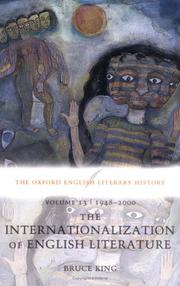
ISBN: 9780199288366 019818428X 9780198184287 0199288364 Year: 2004 Volume: 13 : 1948-2000 Publisher: Oxford Oxford University Press
Abstract | Keywords | Export | Availability | Bookmark
 Loading...
Loading...Choose an application
- Reference Manager
- EndNote
- RefWorks (Direct export to RefWorks)
In the future, what will 'English Literary History' mean? A literary history of England, or one with much looser boundaries, defined only by a communality of language, not by location or history? In this, the last volume in the Oxford English Literary History , Bruce King discusses the literature written by those who have chosen to make England their home since 1948. With decolonization following World War II, and the growth of large immigrant communities in England, came a wave of colonial, postcolonial, and immigrant writers whose entry onto the British cultural landscape forces us to consider what it is to be British, English, or national now that England is multiracial and part of a global economy. King addresses these new trends in English literature and the questions they raise in the first wide-ranging and comprehensive account of immigrant literature set in a social context. Ranging through Black and Asian British prose, poetry, and drama, and writers including V. S. Naipaul, Salman Rushdie, Hanif Kureishi, and Zadie Smith, King reveals the development of the literature from writing about immigration to becoming English. Now that the literature of England includes Sri Lankans, Egyptians, and British Nigerians, does this mean that we can no longer talk of the English nation as a cultural unit? King concludes persuasively that it does not. We have not seem the demise of national cultures; rather, a new, accomplished, and socially significant body of writing in England is influenced by the interaction between foreign cultures and British traditions. This bold and challenging account of British culture will shape debate for future generations.
#KVHA:Literatuurgeschiedenis; Engels --- 820 <09> --- 820 <09> Engelse literatuur--Geschiedenis van ... --- Engelse literatuur--Geschiedenis van ... --- English literature --- anno 1980-1989 --- anno 1960-1969 --- anno 1950-1959 --- anno 1970-1979 --- anno 1990-1999 --- Engelse literatuur--Geschiedenis van .. --- Engelse literatuur--Geschiedenis van . --- Engelse literatuur--Geschiedenis van --- LITTERATURE ANGLAISE --- LITTERATURE DU COMMONWEALTH --- 20E SIECLE --- HISTOIRE ET CRITIQUE
| Listing 1 - 10 of 31 | << page >> |
Sort by
|

 Search
Search Feedback
Feedback About UniCat
About UniCat  Help
Help News
News